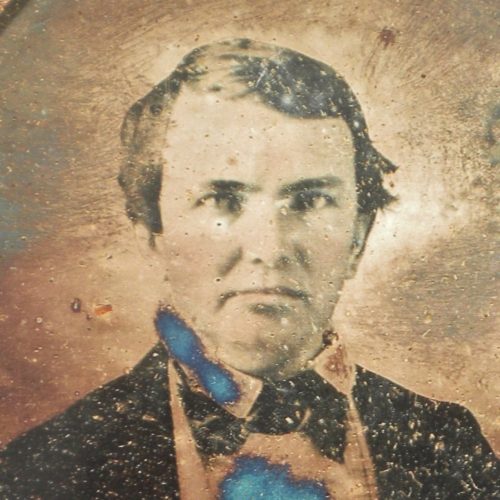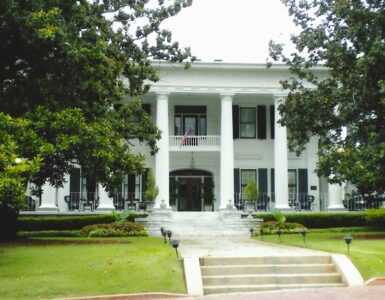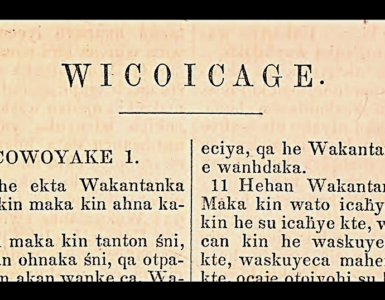 Following the First World War, J. Gresham Machen had concluded his work with the YMCA and was travelling in France while awaiting his return to the United States. In a letter written in February 1919, he mentioned to his mother, Mary (Minnie) Gresham Machen, that he had spent a night in Dijon. The city, likely associated more with mustard today, had reminded him of his grandparents’ garden in Macon, Georgia, because it had the Gloire de Dijon Rose among its specimens. The photograph of the house taken a few years ago shows its recent appearance with two grand magnolia trees flanking its entrance. The home was completed by John Jones Gresham in 1842 and continues today as a bed and breakfast. However, the garden as Machen remembered it is no longer adorning the property.
Following the First World War, J. Gresham Machen had concluded his work with the YMCA and was travelling in France while awaiting his return to the United States. In a letter written in February 1919, he mentioned to his mother, Mary (Minnie) Gresham Machen, that he had spent a night in Dijon. The city, likely associated more with mustard today, had reminded him of his grandparents’ garden in Macon, Georgia, because it had the Gloire de Dijon Rose among its specimens. The photograph of the house taken a few years ago shows its recent appearance with two grand magnolia trees flanking its entrance. The home was completed by John Jones Gresham in 1842 and continues today as a bed and breakfast. However, the garden as Machen remembered it is no longer adorning the property.
John Jones was born January 21, 1812 in Burke County, Georgia, to Job and Mary Jones Gresham. Job and Mary had been married in 1807. He was raised in the country on his father’s farm near Brier Creek. His early education was accomplished in local rural schools until he reached the age of fourteen when he went to an academy in Waynesboro, after which he attended another academy that was located at Richmond Baths. Richmond Baths was named for its hot springs retreat. Remaining in his home state, John Jones entered the sophomore class of the University of Georgia in 1830. After three years, he completed his degree graduating with first honors.
William T. Gould, a Yale man, operated a law school in Augusta where John attended and was then admitted to the bar in Waynesboro in 1834. Attorney Gresham commenced practicing law in Waynesboro, but due to health concerns after suffering two bouts with fever he moved to Macon in 1836. After a brief partnership with Gen. Robert Beall that ended due to his death, Gresham entered practice with Edward D. Tracy in 1838 continuing with him until he retired. On May 25, 1843, John Jones married Mary Edgeworth Baxter, who was the daughter of Thomas W. Baxter of Athens. She was described as “beautiful, refined, and cultivated.” They would have five children, two would die in infancy, LeRoy Wiley would die in his teens after a life of pain and failing health, and Thomas and Minnie would grow to have families of their own. While practicing law he owned two plantations and was also elected the mayor of Macon for terms beginning in 1843 and 1847. However, by 1850, J. J. Gresham decided that he had had enough of the world of arguing cases in the courthouse, so he sought a new source of income.
J. J. Gresham made a considerable transition in profession when he and Nathan C. Munroe, William B. Johnston, Thaddeus G. Holt, and others teamed up to open a large mill on Oglethorpe Street for the manufacture of cotton and wool. The mill was incorporated the Macon Manufacturing Company by the General Assembly of Georgia in 1854. Two years later, he and eight others incorporated the Warrenton and Macon Railroad Company to operate trains between the two towns. His business interests were quite profitable until the Civil War. For reasons unknown, in December 1861, Gresham entered another business when he and others established the Georgia Mutual Insurance Company with capital stock of two-thousand shares at one-hundred dollars each. Note the date, December 1861, the Civil War was in full swing and events to date looked like the Confederacy would be victorious. However, as the war progressed and the South was defeated, J. J. Gresham found himself strapped as were so many in the South. He might have reconsidered entering the fire, marine, and life insurance business if he could have foreseen the defeat of the Confederacy and its many fires, sunken ships, and lost lives. Reticent to return to law even though he was a judge for a portion of the time since he left his practice, the uncertainties of Reconstruction contributed to his return to law for its more  reliable income. His renewed practice was enhanced by his partnership with his son, Thomas Baxter. The several years away from law had not improved his opinion of courtroom wrangling, so after a few years of renewed practice and increasing frustration, he retired from law to manage his investments and work for better education.
reliable income. His renewed practice was enhanced by his partnership with his son, Thomas Baxter. The several years away from law had not improved his opinion of courtroom wrangling, so after a few years of renewed practice and increasing frustration, he retired from law to manage his investments and work for better education.
J. J. Gresham knew that the future of the post-war South would be greatly dependent upon quality education, which resulted in his support of education not only financially but also with his leadership. In 1872, Gresham and other notables were appointed by the state to be the Board of Education and Orphanages for Bibb County. He continued on the Board of Education for many years. At that time, their facilities included Bibb County Orphan Home, Macon Free School, and the school funded by the bequest of Elam Alexander (died 1863), Alexander Free School. He was for several years the treasurer of the Macon Free School and at the time of his death was chairman of its board. He also was the president of the Alexander Free School for several years. The University of Georgia honored him by having him serve on its board for over twenty years and he was for a time its president. He also was a trustee and treasurer of Oglethorpe University. The Central High School in Macon was renamed Gresham High School in honor of Judge Gresham’s many contributions to education.
The Gresham household were members of First Presbyterian Church. Along with Judge Gresham’s vocational, educational, and legal interests, he was a churchman. He was elected an elder of First Church in 1847 and continued to serve until his death; for forty one of his years as elder he was the clerk of session. While wintering in Philadelphia in 1854, he obtained the plans that would be used to construct the current church building on Mulberry Street. When the building was completed in 1858, about one fifth of its cost had been paid by John and Mary Gresham. When the Second Presbyterian Church was built, the Greshams also provided funding. He was a member of the Board of Directors of the Theological Seminary in Columbia, South Carolina, where he established the LeRoy Gresham Chair in memory of his son that had died in 1865.
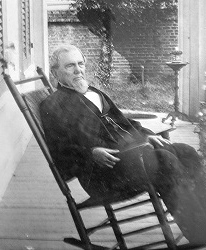 John Jones Gresham died at 9:00 in the evening of Friday, October 16, 1891, at the home of his daughter and son in law, Minnie and Arthur Webster Machen, in Baltimore. Judge Gresham had been travelling and visiting family in Virginia, then he went on to Maryland to visit the families of Thomas and Minnie. He was not ill and his death was unexpected. Minnie and Thomas accompanied their father’s remains when they were returned to Macon on the Richmond and Danville Railroad arriving on Monday evening. Following visitation in the family home on Tuesday, his funeral service was led by Rev. W. B. Jennings of First Presbyterian Church who used for his sermon text, “Know ye not that there is a prince and a great man fallen this day in Israel?” (2 Samuel 3:38). The Board of Education honored its deceased member by attending the funeral, closing all the public schools for the day, and asking all teachers and students to attend the service and gather at the church for a procession to the cemetery. Gresham High School, Second Presbyterian Church, and Alexander Free School were draped in mourning. Both the Southwestern Railroad and Central Georgia Bank honored their deceased director by closing for a part of the day. The University of Georgia suspended its classes at noon and at 3:00 the chapel bell called the professors and students to remember President of the Board of Trustees John J. Gresham. He was buried in Rose Hill Cemetery next to Mary who had died in 1889.
John Jones Gresham died at 9:00 in the evening of Friday, October 16, 1891, at the home of his daughter and son in law, Minnie and Arthur Webster Machen, in Baltimore. Judge Gresham had been travelling and visiting family in Virginia, then he went on to Maryland to visit the families of Thomas and Minnie. He was not ill and his death was unexpected. Minnie and Thomas accompanied their father’s remains when they were returned to Macon on the Richmond and Danville Railroad arriving on Monday evening. Following visitation in the family home on Tuesday, his funeral service was led by Rev. W. B. Jennings of First Presbyterian Church who used for his sermon text, “Know ye not that there is a prince and a great man fallen this day in Israel?” (2 Samuel 3:38). The Board of Education honored its deceased member by attending the funeral, closing all the public schools for the day, and asking all teachers and students to attend the service and gather at the church for a procession to the cemetery. Gresham High School, Second Presbyterian Church, and Alexander Free School were draped in mourning. Both the Southwestern Railroad and Central Georgia Bank honored their deceased director by closing for a part of the day. The University of Georgia suspended its classes at noon and at 3:00 the chapel bell called the professors and students to remember President of the Board of Trustees John J. Gresham. He was buried in Rose Hill Cemetery next to Mary who had died in 1889.
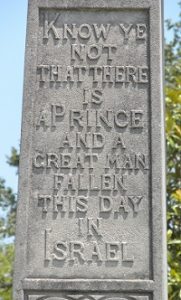 The Macon Presbytery of the Presbyterian Church in the United States (PCUS) was in session on Saturday, October 17th when it received the news of Judge Gresham’s death. The saddened presbyters responded by composing a brief letter of condolence to Thomas Gresham. B. M. Palmer, pastor of the First Presbyterian Church in New Orleans wrote letters of condolence and encouragement to members of Judge Gresham’s family. An excerpt from one of Dr. Palmer’s letters shows the great loss he felt as he expressed not only his own sadness but also the grief sensed by his contemporaries.
The Macon Presbytery of the Presbyterian Church in the United States (PCUS) was in session on Saturday, October 17th when it received the news of Judge Gresham’s death. The saddened presbyters responded by composing a brief letter of condolence to Thomas Gresham. B. M. Palmer, pastor of the First Presbyterian Church in New Orleans wrote letters of condolence and encouragement to members of Judge Gresham’s family. An excerpt from one of Dr. Palmer’s letters shows the great loss he felt as he expressed not only his own sadness but also the grief sensed by his contemporaries.
The world can ill afford the loss of a single good man; and there are some so great as well as good that we cannot win our consent they should ever die. They seem so necessary to all the interests taken under their protection that we instinctively feel as though everything must fall to pieces without their presence and providential care. Hundreds of hearts through the State of Georgia were bowed under this sense of loss, when the tidings of your father’s death flashed over the wires. Not only in Macon but wherever he was known, the spontaneous cry was “A great man and a prince has fallen this day in Israel.”
BY BARRY WAUGH
Epilogue–On January 21, 1899, which would have been J. J. Gresham’s eighty-seventh birthday, his children, Thomas and Minnie, were present to honor their father at the dedication of the John J. Gresham building for the Macon Hospital Association. Minnie and Thomas had funded its construction to fulfill his desire to have a facility that would be available so the impoverished could be provided with healthcare. Minnie commented regarding her father’s opinion of money and its purpose that, “money was with him a means for gratifying the innocent desires of his loved ones, and for the achievement of noble and beneficial purposes” (Stonehouse, Machen, OPC ed., 13).
Sources–The two photographs of J. J. Gresham are copies of pictures used by permission of the 1842 Inn, which currently occupies the Gresham home in Macon. The color picture of the inn and of the grave inscriptions for John Jones Gresham and LeRoy Wiley Gresham were taken by the author of this site. The letter Machen wrote to his mother is in Letters from the Front: J. Gresham Machen’s Correspondence from World War I, 2012. The primary sources include, Testimonials to the Life and Character of John Jones Gresham, Baltimore, 1892, which is available at the Macon Library, and the second source, Addresses Delivered at the Dedication of the John J. Gresham Building at Macon, Georgia, January 21st, 1899, Baltimore, 1899, was kindly provided in PDF by Karla Grafton, Westminster Theological Seminary. D. G. Hart’s book on J. G. Machen was consulted and some of the specifics regarding Gresham’s business and public service interests were obtained from Georgia Legislative Documents Online, which were accessed through the University of Pennsylvania site at, http://onlinebooks.library.upenn.edu/webbin/serial?id=galegacts.
Notes—LeRoy Gresham, 1871-1955, was Thomas B. and Lula Gresham’s son that was named for his uncle, LeRoy Wiley Gresham, 1847-1865. LeRoy had lived his brief life with considerable physical afflictions including injuries received when he was dropped at an early age. The Library of Congress has a multi-volume diary written by young LeRoy that spans several years of his life. He had an inquisitive and penetrating intellect that was borne by a frail and afflicted body.
J. G. Machen’s mother’s given name was “Mary,” and her mother’s name was “Mary,” thus it is likely that Machen’s mother’s nickname, “Minnie,” was given to her to avoid household confusion–possibly an endearing name given to her by her father.
It is interesting that the sermon at Judge Gresham’s funeral, the verse quoted by B. M. Palmer, and the verse upon the grave marker for J. J. Gresham are the same, 2 Samuel 3:38. The verse must have had particular significance to Judge Gresham and his friends and kin were aware of its significance to him.
The Second Presbyterian Church of Macon changed its name to Tattnall Square Presbyterian Church in 1892 according to James Stacy in A History of the Presbyterian Church in Georgia. Stacy also notes that it was first received by Macon Presbytery in 1887 but it appears the church was started in 1871.


